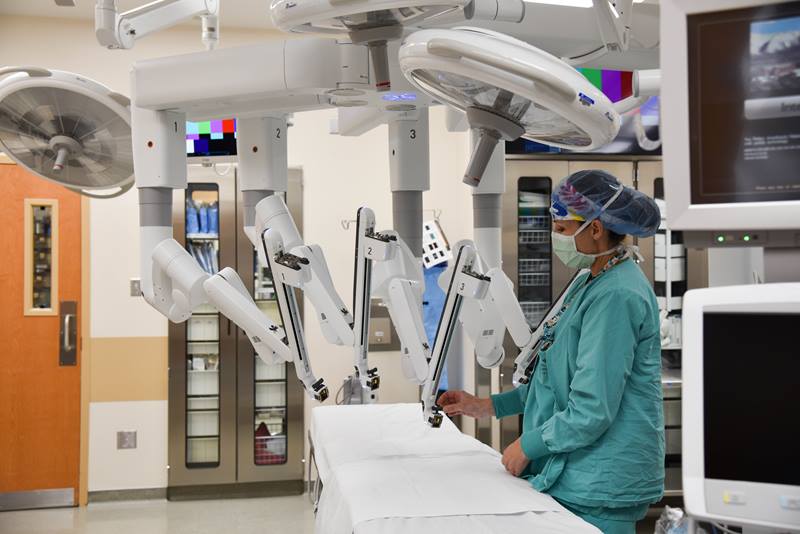Use Intermountain Connect Care®
Learn More.
How can we help?

Surgeons at Intermountain Healthcare are now performing robotic-assisted surgery to advance surgical care for treatment of benign and malignant tumors of the lungs, esophagus, and chest wall.
For the first time, Intermountain surgeons began using the new da Vinci Xi surgical system in September for patients undergoing thoracic surgery at Intermountain Medical Center in Murray.
Patient Curtis Privet, 66, who received one of the first robotic lobectomies at Intermountain Medical Center, says he’s surprised at how quickly he healed from the four small incisions. He was back home in just two days to continue his recovery from lung surgery.
“Robotic surgery allows patients access to minimally invasive surgery with less pain, less blood loss, shorter hospital stays, smaller scars, and quicker recoveries,” said Richard Matern, MD, Intermountain director for robotics integration. “Patients are just happy getting back to life as soon as possible.”
Robotic-assisted surgery is a complimentary approach along with video assisted thoracoscopy that expands the availability of minimally-invasive procedures for thoracic disease to patients in Utah and throughout the Intermountain West.
A robotic-assisted surgery is performed through three to four small incisions. The surgeon uses a highly magnified 3D high-definition viewer to see the surgical areas. The surgeon then moves the robot’s four “wristed” instruments through the use of hand and foot controls. The motions are in tandem with the surgeon’s hands – allowing for greater dexterity, control, and precision.
“The surgeon has complete control of every instrument so you’re not relying on an assistant to move the camera as you operate in these difficult angles and confined spaces,” said Intermountain surgeon Nick Byrge, MD.
For thoracic surgeons operating in a small area around the heart, lung and rib cage, robotic-assisted surgery allows for more surgical accuracy in complex cases involving sensitive nerves and tissues.
“The minimally invasive surgery provides better visualization for the surgeon,” said Intermountain thoracic surgeon Peter Smit, MD. “Robotics offers more precise and finer dissection of critical vascular and organ systems in the dynamic chest cavity.”
The new da Vinci robotic system can also be programmed and positioned for other robotic surgeries like hernia repairs, urological and gynecological procedures, as well as stomach, bladder, kidney and intestine surgeries.
Not every patient is eligible for robotic surgery, according to Dr. Matern. Surgeons consider candidates based on anatomy, medical history, and a patient’s specific condition, he said.